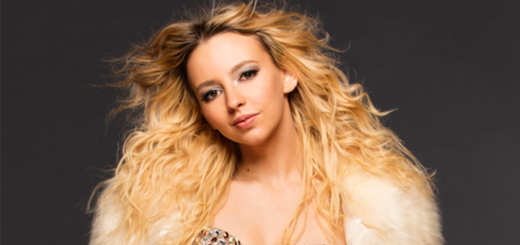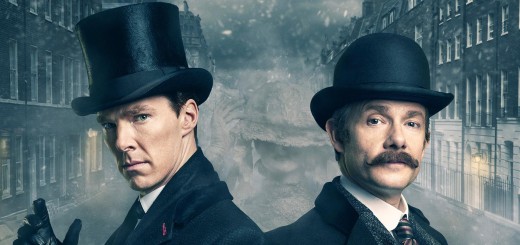THE MARVELOUS MRS. MAISEL Review
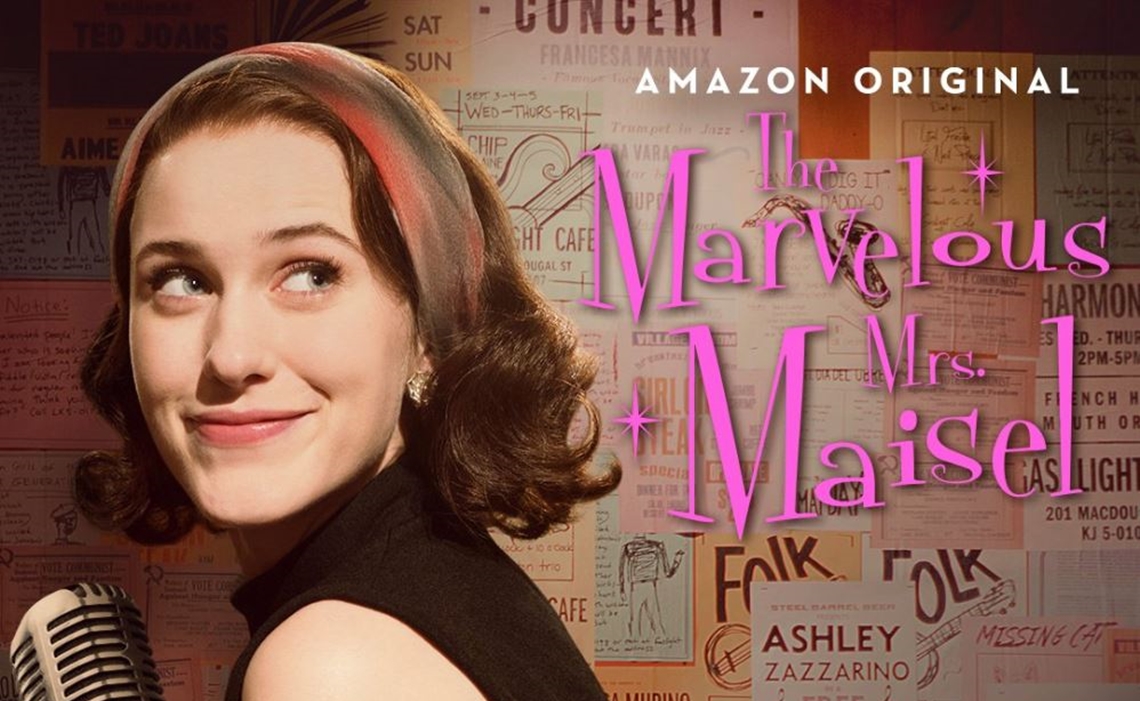
Amazon’s THE MARVELOUS MRS. MAISEL has a lot working against it: I understand that a 1950s period piece about a pioneering female stand-up comedian could easily become a narrative Bustle article, but I’m happy to say that MAISEL avoids that in every conceivable way. Too often cable period pieces are what you recommend to your parents because the production design is lovely and it doesn’t force them to reconcile their questionable opinions on minorities. But what keeps MAISEL in my good graces is that it isn’t a show that glosses over how terrible your life would be in the ‘50s as a woman, let alone a female Jewish comedian. Between indulging in the aesthetics of the time period and showing the horror of everything that every man has ever said, MAISEL finds itself with something to offer no matter which aspect of it you came for, resulting in a highly enjoyable series that shows its audience that women are funny, crass, delightful, intelligent trainwrecks, and they have been for decades. Whether you came for the time period, the woman, the writing, or the comedy, this show delivers in all aspects.
THE MARVELOUS MRS. MAISEL opens with Miriam “Midge” Maisel’s wedding toast, where Midge (Rachel Brosnahan) recounts her romance with Joel (Michael Zegen) in front of their families through rose-colored glasses. After the toast we flash forward a few years to see Midge’s wonderful life: beautiful apartment, beautiful clothes, beautiful family, only to have it all ruined by the discovery of her husband having an affair with his secretary. This earth-shattering revelation sends a drunken Midge to the Gaslight, the stand-up comedy venue where her husband has been indulging his own comedic whims, where Susie (Alex Borstein) sees her on-stage mental breakdown as a new talent in the making. The eight-episode first season takes us through Midge’s newfound personal struggles as she learns how to mine them into comedy gold, and as she does, Midge has to decide for herself if comedy will be the thing to destroy her life, or the thing to save it.
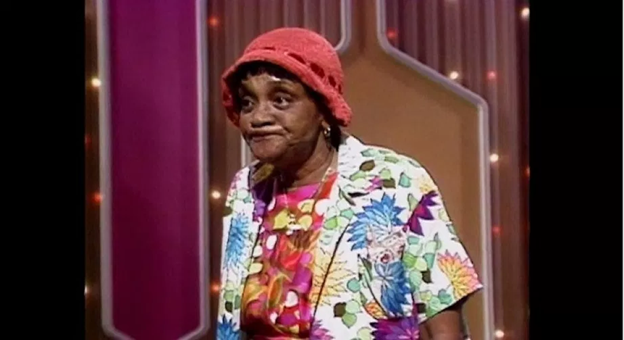
Moms Mabley (1894-1975), was an openly lesbian stand up comic who worked for over 50 years in Vaudeville, television, and stand up from the ‘20s to ‘70s
I’m surprised at how much I enjoyed this show—not that I was specifically prejudiced against it from the premise, but I’ve been let down a bit by cable television recently. First and foremost, there’s an epidemic of TV content that’s only watchable when binged, and secondly, there’s been a string of showrunners being given too much freedom with disastrous results. I even had MAISEL showrunner Amy Sherman-Palladino on that list because of GILMORE GIRLS: A YEAR IN THE LIFE (which to this day I haven’t bothered to finish), but after MRS. MAISEL I’m letting her out of the doghouse. I really, really liked this one.
Another reason to be pleasantly surprised here is that MAISEL manages to find something new among the plethora of ground already covered in the TV world about struggling comedians. Even researching the number of TV shows about struggling comedians exhausts me. And while shows about nothing have had their moments, I’m surprised it took this long to find the benefits of being about something. MRS. MAISEL doesn’t shy away from its heroine’s flaws—Midge is privileged, materialistic, and reckless—but it also shows why she is that way. The show doesn’t condone her bad behaviors, but rather explains them. Midge comes from a world that encourages her to take her measurements every day, to take off her makeup in secret, and to care more about a brisket than her sanity; but when her husband leaves her, it exposes the sheer craziness of keeping up the façade of her perfect life and that’s where she starts finding laughs. Midge uses stand up to speak out about everything from the hypocrisy of the rich to the truth about Jewish girls in the bedroom—things that no other comedian was using—and that’s how she starts finding her footing. She doesn’t hold flawless societal views either—she’s got some internalized misogyny for sure, and the series has plenty of room to diversify in its upcoming second season—but Sherman-Palladino is reasonably careful to make sure it’s society that’s the butt of the joke, not the women themselves. It’s an important difference that keeps the show feeling progressive without being disingenuous to the era. And it’s what every good comedian should be doing—using laughs to show what’s crazier between a drunk woman doing stand up in a nightgown or walking in on your parents separating their beds after their monthly night of sex.
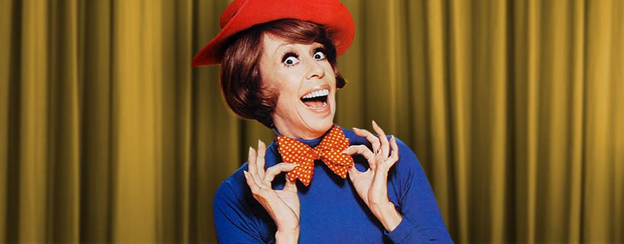
Carol Burnett (1933- hopefully never). The Carol Burnett Show (1967-1978) ran for 11 seasons and won 25 Emmys
It’s important that Midge’s success as a comic is not immediate—and it isn’t. After her initial breakout she takes a meandering path, has highs and lows, and makes good decisions and bad ones (both personally and professionally). It helps keeps the show grounded amidst the screwball glam that the costumes and dialogue bolster. The second half of the season shows Midge and Susie working on her set at the Gaslight, working to refine every punchline to get Midge’s jokes slightly funnier each time as she expands on moments she sees around Manhattan. This sequence is particularly impressive because Sherman-Palladino not only had to write a stand up set, but had to write multiple drafts of it getting slightly funnier each time—learning that she worked at LA’s Comedy Store for two years, it fits. It’s a great window into a part of stand up that we don’t see, and it’s gratifying to see the work that gets put into these punchlines, doing its part to show that stand up is anything but drunken ranting, despite how Midge got her start.
Aside from Sherman-Palladino’s personal inspiration, MRS. MAISEL also pulls a bit from real-life. To underscore my photo choices, the notion of a female comic in that era is not a fantasy. Multiple women were able to have careers in stand up (and vaudeville before that), and in this case, according to Rachel Brosnahan, she found inspiration in Jean Carroll, a 1950s comic who performed fast jabs in eveningwear. And while Midge is properly intimidated and heckled for being a woman, MAISEL doesn’t let her be alone as a female standup by introducing the fictional Sophie Lennon (Jane Lynch) to be an established comic for Midge to open for. When they meet offstage, Midge sees that even though Lennon’s onstage persona is a disheveled Queens housewife, her private persona is something that makes Midge question her own ability to be a female standup altogether. Lennon’s character is a smart move to establish that along with great friends and mentors, life will also give you terrible advice you need to learn to ignore. Additionally, it reveals that in Midge’s eyes, women’s support of each other isn’t unconditional—women who don’t support other women don’t deserve that support in return.
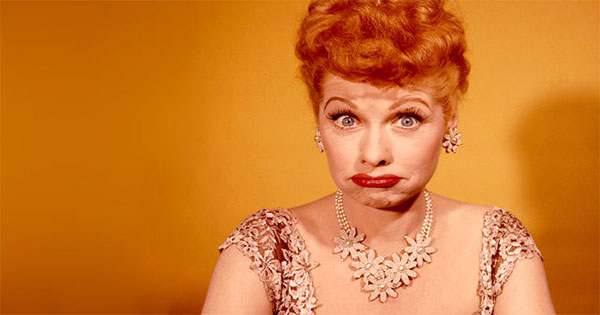
Lucille Ball (1911- 1989). In starting Desilu productions (which currently exists as Paramount Television), she became the first female head of a major TV studio. The company produced, among other things, Star Trek
Most know showrunner Sherman-Palladino from Gilmore Girls, and there are plenty of Gilmore Girls comparisons to be made between the two series: Midge and Susie are another version of Lorelai and Sookie, and Midge’s upper class family who can’t cope with a daughter starting to deviate from societal expectations should sound very, very familiar to fans. I can see how the parallels would bother some viewers, but I’m not among them. Bickering brunettes works for Sherman-Palladino like treadmill monologues work for Sorkin, and there’s enough to Maisel that it stands on its own. Besides, Sherman-Palladino is responsible for some of the best written female friendships to grace network television—friendships that render the Bechdel test obsolete and are based on supportiveness and empowerment—and you can’t have too many of those on TV. Her MAISEL scripts, like Gilmore Girls, run pages beyond a standard hour-long length due to the intimidating words-per-minute they demand. Some may not appreciate the updated screwball dialogue, but if you want to take it down as unrealistic, you have to take Sorkin and his four Emmys down with it.
It would be easy to recommend MRS. MAISEL simply as a fun, whimsical period piece about a quirky heroine and her unusual career choice for a 1950s housewife, but there’s more here. If you vehemently hate period pieces I wouldn’t say this is the show to change your mind, but everyone else should be good to go. Among being a solid comedy with a concise plot, it’s a show for standup nerds as well. Maisel shows the how and why behind comedy by going back into its history: why the best comedians aren’t just bitter grumps, but people who are willing to spend enough time with their tragedy to spin it into laughs, and who use their microphone to say what should and shouldn’t be absurd. That comedians need to have something to say. This show isn’t reinventing television, but it is showing us that the smartest way to give us something new in a crowded genre is to let women and minorities run the show and give them control over their own culture on screen.
Verdict: Recommend


